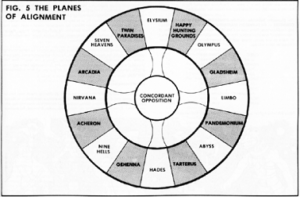This is Faith in Play #60: Afterlife, for November 2022.
What happens when we die?

Never Allow Such Travelers Entrance Here, Opines God;
Lower Planes Are Too Heavily Guarded Near Accesses
The western religious view (I call it “western” because it is the view of most but not all Christians and Muslims) is that the soul or spirit goes to a place of either punishment or reward, depending on what it deserves. It is not the only view in the world, of course. Atheists will tell you that the person ceases to exist at death. There is a prevailing eastern view that the spirit returns, reincarnated in some other creature based again on what the person deserves, with the ultimate reward of being absorbed into a vast impersonal existence and ceasing to exist as an individual. There have been other views through time; the Norse people anticipated that the best warriors would be selected to fight with the Gods in the doomed battle of Ragnorak, where the Giants will beat the Gods in the end. Meanwhile, in actual fiction, the Klingons believe in Sto-vo-kor for the worthy warriors, where they will fight an eternal battle against powerful enemies. But the western views tend to pervade our games. Even Dungeons & Dragons® with its complicated cosmology of sixteen outer planes gives the impression that the dead go somewhere where they are rewarded or punished for eternity; and our non-fantasy games tend to treat death as the end, with nothing thereafter.
You probably are pretty certain what happens to you when you die; certainly I am, to a significant degree. You probably also know what happens to characters in your game world when they die, whether or not all the players know. However, just because that has been determined doesn’t mean it’s common knowledge within the world. Just as significant as what actually does happen to the character after death is what his culture believes happens to him. Do the birds carry his spirit to the clouds, where he exists forever as a mist? Or perhaps, does he become a bird, watching the world thereafter? Does he turn into worms, or insects, or other creatures of the dirt? Is he in suspended animation of some sort, awaiting a future awakening to something else?
What is interesting about these alternative notions of the afterlife is that they are integrated into their cultures. They tell us much about how those people view the world, life, death, and the nature of people. Do these people believe that there is some part of you that survives beyond the grave, and if so what part, and how does it survive? Does it need help to survive, as the Egyptians mummified their dead and built lavish homes for some of them so that the bodies would be able to continue in future comfort? Or does the life need to be freed from the body, as by the excarnation practiced in some religions?
From exploring what people might think about the afterlife, we can approach what those at the table think about it, and from that delve into what is the truth.
And that seems a good exploration to me.
Previous article: Ghosts.
Next article: Christian D&D.
